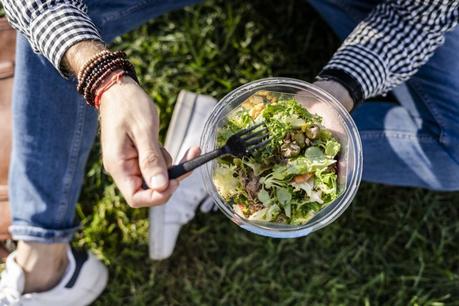PROTEIN HERE, PROTEIN there, protein... everywhere.
"It seems like almost everyone is talking about a high-protein diet and food manufacturers are capitalizing on this trend," says Maelee Wells Sutton, RDN, CPT
With the plethora of research-backed health benefits of protein, there seems to be a good reason for society's collective obsession with protein. That benefit is universal, no matter who you are or what your goals are. It's essential for building muscle. It's great for those striving for weight loss because eating a diet with a protein intake higher than the government recommended amount has been observed to increase fat loss and decrease muscle loss. It is even to be associated with a reduction of several aging measurements. And that's just the tip of the iceberg.
Below you can read more about the benefits of a high-protein diet and smart ways to get more protein.
What exactly is a high protein diet?
Proteins are found in your muscles, bones, skin, hair and other parts of your body, according to the Harvard TH Chan School of Public Health It helps fuel several chemical reactions in your body, including driving hemoglobin, which moves oxygen in your blood.
So consuming protein is good for you, but defining what's considered "high protein" is tricky, says Kris Sollid, RD, senior director of nutrition communications at IFIC.
"For example, some protein recommendations are based on the percentage of calories in a diet that come from protein," he says. "Other protein recommendations are based on body weight."
Most experts agree that adults should at least get a good education. 0.8 grams of protein for every kilogram of body weight per day.
Consuming an amount above this recommendation is considered a high protein diet, Leah Silberman, RDa certified dietician at Medical Practices in Manhattan say.
A high protein diet might look like this:
High protein content based on body weight
A rule of thumb for high protein for the average person is 1.2 grams or more of protein per kilogram of body weight, says Sollid. If you do intense workouts and strength training, you can increase your protein intake to 1.75 grams.
If you choose 1.75 grams of protein per kilogram of body weight per day, this amounts to:
- About 125 grams per day for a 70 kg man
- About 160 grams per day for a 90 kg man
What are the benefits of protein?
Protein has been shown to aid in weight loss and weight management because it helps you feel fuller for longer. study found that when overweight participants increased their protein intake from 15 percent to 30 percent, they ate about 400 fewer calories per day.

Tetra images // Getty Images
Research also shows that eating more protein helps you maintain muscle mass and build muscle and strength during resistance training.
Protein has potential metabolism-promoting effectsIt might also help lower your blood pressure and promotes bone health.
Can you eat too much protein?
While you can eat too much of anything, Sollid says most healthy people don't need to worry about consuming too much protein. But if you have pre-existing health conditions, like kidney disease, you should keep a closer eye on your intake.
Despite concerns about the link between excessive protein intake and kidney damage, MH recently reported on new research showing that a high-protein diet may actually protect against kidney disease in otherwise healthy individuals.
There is no official "threshold for too much protein," as individual tolerances vary, Silberman says. However, she adds, more than 2 grams of protein per kilogram of body weight may not provide any additional benefits.
What are the disadvantages of a high protein diet?
If you put too much emphasis on protein, you may neglect other important nutrients, like fiber, Sollid says.
"Fiber is only found in plant foods, so depending on the source of the protein, a high-protein diet with too much emphasis on animal products and not enough fruits, vegetables, and whole grains can also be a low-fiber diet," he explains.
And be sure to drink more water when you eat more protein, she adds. "It can put you at greater risk for dehydration, because the body needs more water to process and remove the byproducts of protein breakdown."
What time of day should you eat protein?
According to Silberman, your body needs protein throughout the day, so you don't need to focus on eating it at specific times.

Westend61 // Getty Images
Proteins provide the most benefit for your muscles If you spread it evenly over meals, rather than eating it all at once, Sollid says.
How to Add More Protein to Your Diet
Protein can come from a variety of plant and animal sources - what you choose to eat is a personal preference. Lean meat and poultry, fish, eggs, and dairy products are good animal sources. Beans, nuts, seeds, and soy products provide plant-based protein.
Incorporating more of these foods into your meals and snacks can help you increase your protein intake. Just be sure to check nutrition labels, Sollid advises.
For example, soy milk often contains more protein than other plant-based dairy products, and Greek yogurt and Icelandic skyr contain more protein than regular yogurt.
Tips to Add More Protein to Your Diet
Before we get into simple ways to increase your protein intake, it's worth noting that you should consult your doctor or dietitian if you have any health conditions that require a lower protein intake (such as chronic kidney disease), says Wells Sutton. In general, you should always consult your doctor or dietitian for advice before making any changes to your diet.
Start your day with protein
It will be significantly harder to hit your protein goals if you wait until lunch or later. Try adding a high-protein Greek yogurt or a serving of nuts to your breakfast or mid-morning snack, suggests Wells Sutton. "Because protein increases fullness, this can also help curb snacking and cravings later in the day," she says.
Expand your protein horizons
Protein can come from a variety of plant and animal sources. Lean meat and poultry, fish, eggs, and dairy products are good animal sources. Beans, nuts, seeds, and soy products provide plant-based protein. Incorporating more of these foods into your meals and snacks can help you increase your protein intake. Just be sure to check nutrition labels, Sollid advises.
"Even if you don't want to increase your protein intake, you may want to consider diversifying your protein choices and eating more beans, chickpeas, lentils, peas, seafood and soy products," Sollid says.
Choose carbohydrate-rich foods that also contain extra protein
Yes, you can eat more carbohydrates as you increase your protein intake.
"This is especially important for vegetarians or vegans, who have a more limited list of protein-rich foods available to them," Wells Sutton says. "For example, choosing quinoa or lentils instead of rice - or a mix of beans and rice. Even small changes can add up over time."
Get to know high-quality protein powders
According to Wells Sutton, you should prioritize whole foods, but don't be afraid to add a high-quality protein powder to your routine.
"For people who want to build muscle, it can be really hard to eat enough protein. In those cases, a protein powder can make the difference between muscle growth and weight loss," she says.
Add protein powder to a nutrient-dense fruit and vegetable smoothie or try making a protein coffee. For the latter, Wells Sutton suggests making coffee with a cup of skim milk or soy milk and then adding a half scoop of protein powder of your choice. "Between the milk and protein powder, this equates to 15-20 grams of protein, and it tastes


